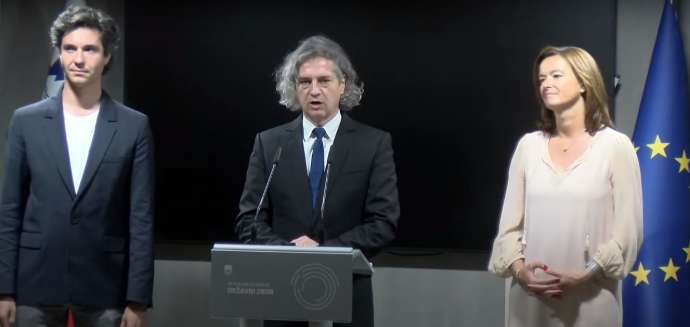STA, 14 May 2022 - As the future coalition partners are expected to initial a coalition agreement on Saturday, some details from the document have already leaked out. The agreement envisages changes in the pension and healthcare system, and there is a commitment to raise minimum wage to EUR 800 and minimum pension to EUR 700.
Some of the details of the agreement have already been revealed by members of the Freedom Movement, Social Democrats (SD) and Left in their public appearances.
Among other things, they announced that around 20,000 apartments with non-profit rent will be constructed in the next two government terms, and that minimum wage would be raised to EUR 800 net and minimum pension to EUR 700.
The plan is to eventually abolish top-up health insurance, and suspend the purchase of Boxer armoured personnel carriers (APCs). Procedures of procurement of military equipment under the government of Janez Janša will be reviewed.
The N1 news web portal portal has also noted the commitment that there will be no razor wire and other "technical obstacles" on the border with Croatia, erected to control illegal migration flow, by the end of this year.
Another proposal is that physicians from the public healthcare system will no longer be allowed to work for private individuals and concessionaires after they finish their shifts in public institutions.
Also in the works is progressive taxation of property, and the coalition will also advocate for the rights of employees to turn off their company phones and e-mail at the end of working hours.
According to the N1 sources, the agreement stipulates that the tax reform of the Janša government that brought higher net wages will be abolished at the beginning of next year.
The online edition of the newspaper Večer adds that the amount of the general personal income tax break will remain the same.
Companies, including start-ups, are expected to receive tax incentives for the digital and green transition, and the effective corporate income tax rate is expected to increase.
The coalition is also expected to promote employee participation in profit and their involvement in the ownership and management of companies, N1 says.
According to the portal, the government intends to launch talks with the EU institutions to amend the national recovery and resilience plan, and that EU funds will be used primarily to finance the green transition and digitalisation.
The coalition promises free school meals to all primary and secondary school students, and curricula in schools are also expected to be somewhat changed, N1 adds.
Večer notes mitigation of the rising energy prices with an emphasis on the most vulnerable groups, promotion of the development of solar power plants and replacement of heating devices on fossil fuel with those on renewable energy.
The future coalition also plans a pension reform that would strengthen the first pension pillar and encourage additional pension savings. In healthcare, it plans to establish updated records of waiting lines for treatment and procedures.
They also promise greater availability of physicians at the primary level, debureaucratisation and digitalisation of the healthcare system and additional financial incentives for the medical staff.
When it comes to the media, the future partners announce that the broadcaster RTV Slovenija and other public media (the Slovenian Press Agency - STA) will be provided with a status that will prevent political interference, Večer says.
They will also work on abolishing electoral units introducing preferential vote in the elections to the National Assembly, which will require a two-thirds majority in parliament.
According to information obtained by the STA, the coalition agreement will include a strategy for abolishing precarious work, where public administration would be an example. There is also the commitment to reduce abuse of part-time employment.
Other goals include a more transparent system of disability insurance, stronger network of public social welfare institutions, prevention of brain drain and a clear migration policy with employment strategy and comprehensive integration.






